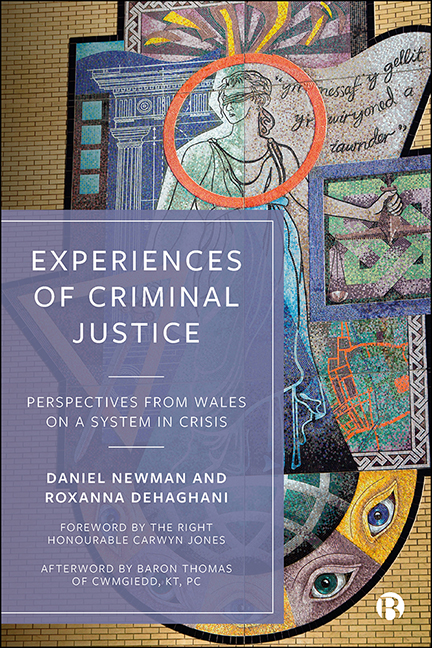Book contents
- Frontmatter
- Contents
- List of Figures and Tables
- Foreword
- Acknowledgements
- 1 Why Wales?
- 2 A System in Crisis
- 3 The People and Their Experiences
- 4 Criminal Justice in Its Place
- 5 Pressures of Practice
- 6 Criminal Justice Relationships
- 7 Navigating the Criminal Justice System
- 8 Doing Criminal Justice Differently
- Afterword
- References
- Index
3 - The People and Their Experiences
Published online by Cambridge University Press: 15 September 2022
- Frontmatter
- Contents
- List of Figures and Tables
- Foreword
- Acknowledgements
- 1 Why Wales?
- 2 A System in Crisis
- 3 The People and Their Experiences
- 4 Criminal Justice in Its Place
- 5 Pressures of Practice
- 6 Criminal Justice Relationships
- 7 Navigating the Criminal Justice System
- 8 Doing Criminal Justice Differently
- Afterword
- References
- Index
Summary
Introduction
In the preceding chapter we set out the impact of neoliberal austerity on criminal justice in England and Wales broadly. The specific focus on the impacts on the police, courts, and criminal legal aid in Wales provided context for the views expressed by participants, who found themselves within a damaged and declining criminal justice system. Such detail grounds this chapter, in which we introduce readers to the participants and draw out how they have experienced criminal justice. Experiences are at the heart of this study; in this chapter we set up the remainder of the book by examining some of the stories of those whose insight and expertise inform our analysis.
To be able to reach an informed view on the experiences explored in the following chapters, it is important to provide the perspectives of the participants in this research. For Newman (2013a: 2) ‘debates around criminal justice are necessarily enthused with an array of values, ideologies and interpretive frameworks’ meaning that ‘any discussion of criminal justice requires that the speaker articulates the choices they have made regarding its purpose’. By this line, the standpoint of those discussing criminal justice is significant and they should never be assumed to approach the subject impartially or neutrally. Such an assumption would be flawed as criminal justice is not merely a theoretical endeavour; criminal justice matters are firmly located within real-life situations, and replete with social contexts and personal implications. Indeed, there are many biases inherent in this study: values inform so much of how we view criminal justice – for Lacey (1994: 34) these are the ‘normative implications’ of discussing criminal justice – that it is necessary to explore these early on.
The approach in this chapter is informed by legal life writing, which ‘offers new ways of advancing legal history and socio-legal scholarship, and of encouraging inter-disciplinary dialogue, both between them, and also with other fields and audiences’(Sugarman, 2015: 32). In order to get a sense of how the participants approached the topics under examination, we believe it necessary that the reader have detail on the backgrounds and histories of participants, and, as such, we do not delve immediately into our data on, for example, the lawyer– client relationship.
- Type
- Chapter
- Information
- Experiences of Criminal JusticePerspectives from Wales on a System in Crisis, pp. 47 - 77Publisher: Bristol University PressPrint publication year: 2022



